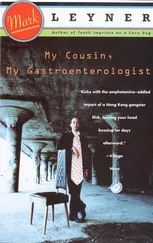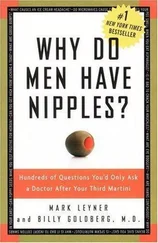I pluck a lollipop from the fishbowl on his desk, wander over to the window, and gaze bemusedly at the gazebo.
Ch-ch-ch. Ch-ch-ch. Ch-ch-ch .
Shortly the doctor swivels back into view and hangs up the phone.
“The warden’s going to make an announcement in her office in a few minutes,” he says.
He stands, circumambulates his desk, and embraces me again.
“If it provides any solace, I want you to know that, medically, I’ve done everything at my disposal to kill your father.”
“I understand,” I quaver, nodding solemnly. “And thank you.”
I pivot and race out of his office, heading straight for the pile of magazines in the waiting room. I retrieve the People I’d been reading and flip frantically to page 115 so I can finally learn the identity of the television personality and Tony Award-winning actor who was ravaged by the three hypnotized wives at a Moscow dinner party. But when I reach 115, I find — to my absolute horror — that someone has cut a rectangular section out of the page including the all-important final paragraphs of the story that had so captured my imagination. And it’s all the more frustrating to discover that the excision of my article was inadvertent. The culprit had cut out a coupon on the reverse page—116—for two Bradford Exchange limited-edition collector’s plates commemorating, respectively, the 1977 professional debut of transsexual tennis player René Richards and the 1993 beating of Reginald Denny during the Los Angeles riots.
“Inmates aren’t allowed to have scissors, are they?” I ask the nurse.
“No,” she says.
“Well, how did someone cut a coupon out of this magazine?” I ask, wiggling my fingers through the hole in the page.
“They use shanks — y’know, homemade knives.”
I shudder.
The image of hardened convicts daintily clipping coupons with their shanks gives me goose bumps.
The warden’s office is a serried, murmuring Who’s Who of penal officialdom: the warden, of course, seated at her desk, signing papers proffered assembly-line-fashion by a feline male secretary with close-cropped orange hair; and milling about and filling the room with gossip and banter are the superintendent; the operations officer; the executioner; the doctor; two of the prosecuting attorneys from the ice-cream scooper murder case; my dad’s lawyer; my dad, who, despite a slightly bilious tinge to his complexion, is chewing his gum mirthfully and talking golf with the rabbi; and a state-appointed stenographer, her fingers a kinetic blur as she endeavors to somehow transcribe the babble of simultaneous small talk.
Given the self-importance and solipsism endemic to seventh graders, I’m assuming that the wardens impending announcement is about me. After the execution attempt and just before I met with the doctor, I’d scribbled and surreptitiously conveyed to the warden two notes that read, respectively, “You wanna get high?” and “Be my sweaty bosomy lover?”
Why she would choose to make such a public response to my homey blandishments, though, I have no idea.
The lithe arm swings over her desk with one final form. The warden signs with a culminating flourish and rises. A dainty throat-clearing and a tentative, collegial “Folks …” goes unheeded. And then a great gurgling hawking up of phlegm and a stentorian imperious “Gentlemen!” effects an instant decrescendo of chitchat, the rabbis punch line “So Moses flings the Pharaoh’s ball into the Sinai and says, ‘Here, use my sand wedge …’” trailing off in the corner of the room, the stenographer’s fingers momentarily still.
“Gentlemen,” the warden says, “I have an announcement to make concerning Joel Leyner C.P. #39 6E-18, and pursuant to Volume 2C, Part Five, Article 11-3 of the New Jersey Department of Corrections Digest of Procedural Regulations and Guidelines , a state-appointed stenographer will herewith transcribe all remarks germane to the disposition of Mr. Leyner’s sentence.
“The State Legislature has vested in the Governor, the Attorney General, and the warden of this institution the following authority, as specified in Section 42J of the Penal Code: ‘In the event of an abortive execution by lethal injection in which the condemned inmate survives, any and all further attempts to execute that inmate by lethal injection within that institution and under the medical supervision of said institution’s physician(s) are prohibited. Subject to unanimous consent of the Governor, the Attorney General, and the institution’s warden, said inmate shall be, with all due speed and by public decree, resentenced to State Discretionary Execution, and thereupon immediately released. Although the State is not hereby required to enforce the death sentence, it may, at its discretion, execute said inmate immediately upon his or her release into the community or at any time thereafter. Said inmate (hereafter referred to as “the releasee”) is subject to discretionary execution immediately upon vacating said institution’s premises and at any time thereafter. In the event of an abortive Discretionary Execution in which the releasee survives, the State may, but is not required to, make an additional attempt or unlimited attempts on the life of the releasee. The Discretionary Execution of the releasee shall be carried out — if at all — whenever, wherever, and however the State of New Jersey deems appropriate, subject only to the inalienable caprices of the State of New Jersey.’
“It is so ordered and adjudged that Joel Leyner be sentenced to State Discretionary Execution and promptly discharged from this institution, this sentence to remain in force until Mr. Leyner’s decease.”
“En inglés, por favor,” I chafe, gnawing my lollipop stick.
“Basically, Mark, your dad’s free to go, but the State reserves the right to kill him the minute he walks out the front gate,” says the warden. “Plus, the State has complete latitude in terms of execution protocols and rules of engagement. In the next ten minutes your dad could be pithed with an English pub dart in the car on the way home from here. On the other hand, he might never be killed — he could live out his life unperturbed and die of natural causes in his slobbering dotage. Or the State could wait until he’s 99 years, 11 months, and 30 days old and then, on his 100th birthday, replace his dentures with molded plastique so that morning, as Willard Scott is telling America what a goodlooking man he is, god bless him — BA-BOOM! Now, if you’ll excuse me for just a moment, there’s some material I’d like you to have before you leave, Mr. Leyner,” she says, exiting her office.
“And this is called what, again?” my father asks the superintendent.
“NJSDE — New Jersey State Discretionary Execution.”
“I think I read about this in Elle,” Dad says. “It’s sort of like an optional fatwa.”
“The feature we like to stress to releasees is the indeterminacy,” continues the superintendent. “You’re living your life, rowing merrily along, and suddenly one morning you wake up and there’s a dwarf ninja crouched on your chest who deftly severs your carotid arteries with two honed throwing stars. Or you’re on a flight to Orlando, Florida, giggling to yourself as you read the Confessions of Saint Augustine, and meanwhile, 35,000 feet below, a New Jersey state trooper steps out of his car, kneels alongside the shoulder of I-95, aims a shoulder-held antiaircraft missile launcher, and blows your 727 into friggin’ curds and whey.”
“They’d do that?” I ask excitedly. “They’d sacrifice all those people just to kill my dad?”
“NJSDE gives us a lot of leeway. We’re no longer encumbered by the federal government, by the FDA, the FAA, the Justice Department … it really unties the hands of the state. I think it’s an extremely innovative piece of statutory legislation. And you have to give the Governor the bulk of the credit. She takes a lot of flak for the narcolepsy and the lathery horse posters, but she was committed to this and very savvy about the politics.”
Читать дальше












